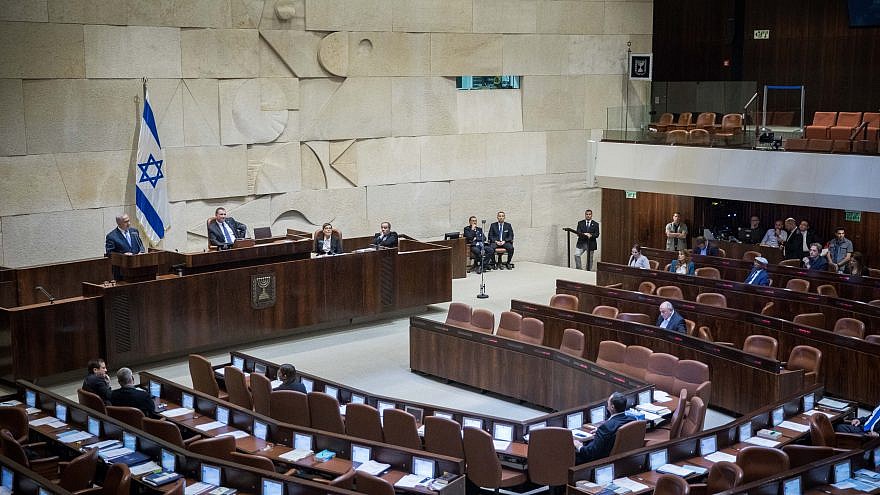What’s normal politics?
Arguments about more benefits? Favoring the middle or lower classes? Something for the religious? My party or yours? Foreign policy? National defense?
Here and now we hear about all of that, but they’re minor words.
Bibi Netanyahu is what matters.
To advance him, or dump him. While he does what he can to stay in the game, as the prosecutor closes in. No extension of hearings on three sets of indictments. No permission for him to get money from a cousin or friends for his legal defense.
Likud means united. And there has been a minimum of rumbles from party leaders about looking for someone else.
But polls are suggesting a weakening of the party, with Bibi at its head.
He failed after the April election to form a government, despite having what seemed like a Knesset majority of 65 seats– that is, 35 of Likud, and another 30 from the ultra-Orthodox, the Orthodox, Kahlon, and Lieberman.
Lieberman defected. At times saying that he supported Bibi as Prime Minister, but at times opposing him. Out front was Lieberman’s opposition to the ultra-Orthodox posture on the non-recruitment of its young men to the IDF. But maybe Lieberman’s posture was really in opposition to Bibi.
Rather than admit defeat and go to the President and ask him to find someone else to make a government, Bibi used his Knesset majority–together with Lieberman’s party–to vote for the dissolution of the Knesset and the calling of a new election. It’ll occur on the 17th of September.
Since then we’ve had several weeks of manipulation by parties and individuals, somehow seeking advantage. We also heard a scheme to cancel the dissolution of the Knesset and the new election. On the one hand, Bibi has been identified with an effort to get a Knesset majority with the help of the Arab parties. And on another hand is talk of his approaching Blue and White with an idea of rotating national leadership– i.e., first Bibi at Prime Minister and then Benny Gantz.
Neither idea has gone to the point of an agreement. But we’re seeing the continuation of an argument about Bibi. He and a coterie of supporters claiming that he won the last election, while others point out that Bibi’s party received the same number of seats as Blue and White, and that he failed to create a government.
Lieberman has since said that there isn’t any difference between Gantz and Bibi. Whoever gets the most votes will get Lieberman’s nod to the President.
What about other issues?
The two parties–largely Jewish–that raise the issue of Palestine are Labor and Meretz. Together they have 10 Knesset Seats, or less than 10 percent. And they are both involved in races for party leadership, with the various candidates claiming that they can do better than the incumbents in increasing the vote. Meretz has voted to change its leader, and Labor votes today. Of its six Knesset members, three of them are running for party leader.
Israelis aren’t talking about a Two-State or Three-State solution. Palestinian issues are on the back burner, far from the front.
Blue and White is the major opposition, but it’s hard to find a difference between its policies and those of Likud. Except with respect to Bibi’s position. Party leader Benny Gantz has been careful to avoid criticizing what Bibi has done over the years, except for the matters raised by the prosecution.
The ultra-Orthodox parties want their own benefits. They oppose Blue and White on account of Yair Lapid’s role in that party, and his opposition to ultra-Orthodox demands, but Benny Gantz has had some meetings with ultra-Orthodox Rabbis.
The Orthodox, i.e., settler-favoring parties, have supported Bibi, but they are currently involved in some internal squabbles involving a Kahane faction, and the possibility that Ayelet Shaked and perhaps Naftali Bennett will join forces with them.
What’s left is the very minor possibility of collaborating with the Arab parties, and the more attractive possibility of a Likud plus Blue and White coalition, but without Bibi.
Getting rid of Bibi undercuts all the disputes. The timing of his hearing on possible indictments would come during the first week in October, a bit more than two weeks after the election. If the results were that he could be given the nod by the President, that would mean simultaneously trying to avoid an indictment (or three) and putting parties together for a government.
Currently Bibi is far from voluntarily excusing himself, and his party isn’t yet ready to dump him.
Ultra-Orthodox parties will likely vote as they did last time. But will their Knesset Members support Bibi? All the other parties should wonder about their votes.
Whatever their prospects, they are not prominent in arguing about benefits for one sector of the population or another, about the Palestinians, or some other issue of foreign/defense policy.
It’s Bibi at the center of discussions, along with his wife and older son. She has pleaded guilty in a deal with the prosecutors about her management of the Prime Minister’s house. And the son has exposed himself several times as a sleaze and political extremist.
There remain those who see Bibi as a modern equivalent of King David, with both positive and negative features, but capable of leading the country.
Whatever, there’s another two and one-half months before the election.
Ehud Barak is in the race, with a fiery speech intensely critical of Bibi.
Commentators are quarreling as to his influence. Will he align with another party or more of them? What will he detract from Blue and White, Labor, Meretz or Likud? What about Barak’s history of changing his posture and alignments? Currently he’s hard fisted against Bibi.
No matter what they all say, the issue is Bibi, in or out.
Early poll shows Barak getting six Knesset seats, and the center-left leading with 61 seats.
Republished from San Diego Jewish World


























